微服务探索之路01篇.net6.0项目本地win10系统docker到服务器liunx系统docker的贯通
本文介绍从创建 net6.0 项目运行在 windows 开发环境的 docker 然后正式部署至 liunx 服务器。
1 windows10 安装 docker
- 下载docker-desktop
- 双击下载后的文件直接安装一直下一步到安装成功
- 打开 docker,点击设置找到 Docker Engine 设置国内镜像
国内镜像地址可以在阿里云找到,阿里云镜像加速器登录之后可以看到一个加速地址,复制出来加入设置 docker 的配置就可以
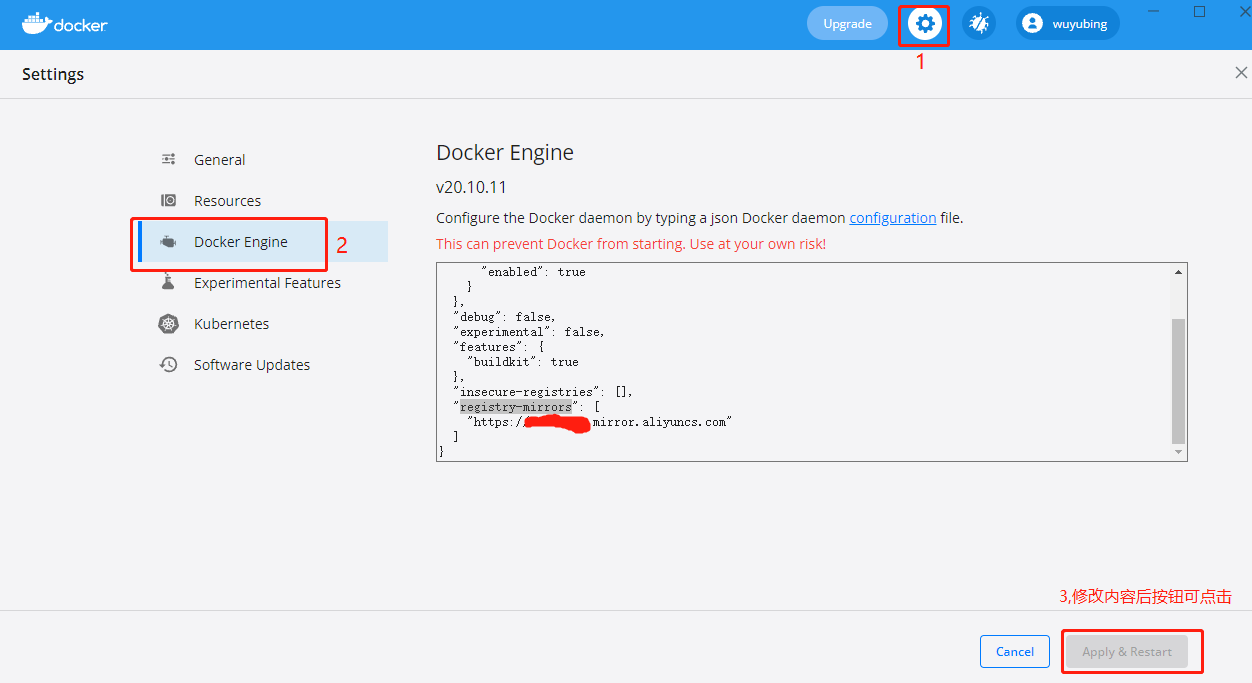
图片里的配置 json 如下:
{ "builder": { "gc": { "defaultKeepStorage": "20GB", "enabled": true } }, "debug": false, "experimental": false, "features": { "buildkit": true }, "insecure-registries": [], "registry-mirrors": [ "加速器地址" ] }
2 用 vs2022 创建一个简单的 net6.0 项目
- 创建项目的时候选择启用 docker,

创建完之后可以发现项目多了一个 Dockerfile 文件(文件属性改为较新则复制,不然发布之后这个文件不会在目录里),修改文件相关内容如下图,避免运行时出错

图上内容最终结果为:
FROM mcr.microsoft.com/dotnet/aspnet:6.0 AS base
WORKDIR /app
EXPOSE 3100
FROM mcr.microsoft.com/dotnet/sdk:6.0 AS build
WORKDIR /src
COPY . .
ENV ASPNETCORE_URLS=http://+:3100
ENTRYPOINT ["dotnet", "WebApplication1.dll"]
- 发布项目至文件夹,发布完成之后文件都在bin\Release\net6.0\publish下面
- 打开命令窗口,切换至发布目录下,执行docker buid生成镜像

注意最后的空格和点是必须的 - 执行完之后打开docker界面可以看到生成的镜像如下图:

- 执行docker run运行镜像!
执行后打开docker界面切到容器运行可以看到运行起来的容器

- 打开浏览器访问http://127.0.0.1:3100/weatherforecast出现界面结果表示成功,weatherforecast这个表示这个项目的路由如果你的项目是其他路由那就写其他的路由不是固定的

3 将镜像推送至dockerhub
1.打开docker界面登录账号(如果没账号请先注册)
2.要上传至镜像仓库需要打上标签,才可以上传,执行标签命令docker tag 镜像名:版本号 dockerhub注册时候填的ID/镜像名:版本号

3.找到打了标签的镜像push
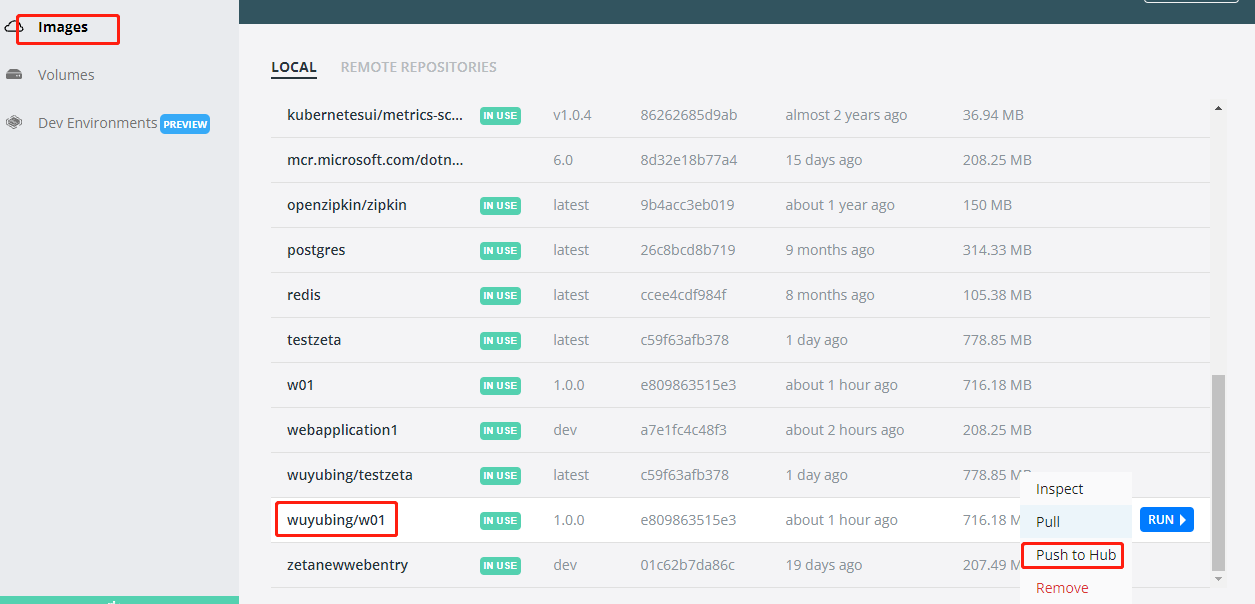
4.等到进度条走完,可以登录https://hub.docker.com查看提交的镜像
4 使用daocloud集群部署镜像到liunx服务器(daocloud已经不能使用2022-6-16记录)
1.在liunx服务器安装docker安装资源比较慢所以使用daocloud的加速镜像安装执行以下命令就可以
curl -sSL https://get.daocloud.io/docker | sh
2.登录daocloud添加服务器主机,方法在登录有一串命令复制到服务器执行就可以关联
3.关联之后找到上一步上传的镜像打开镜像进行部署
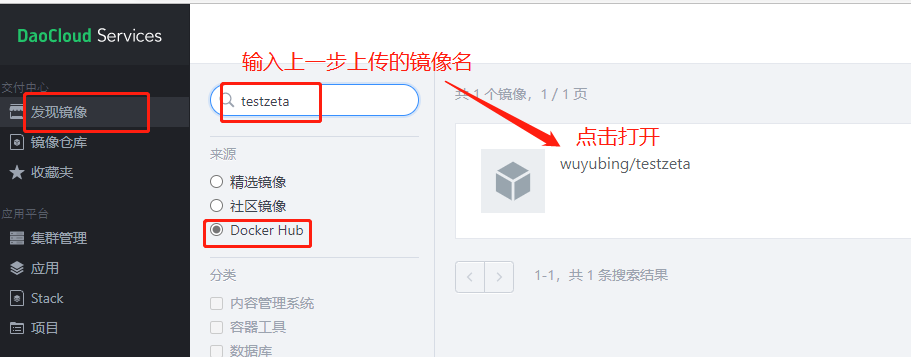
4.点击部署出现如下界面进行配置
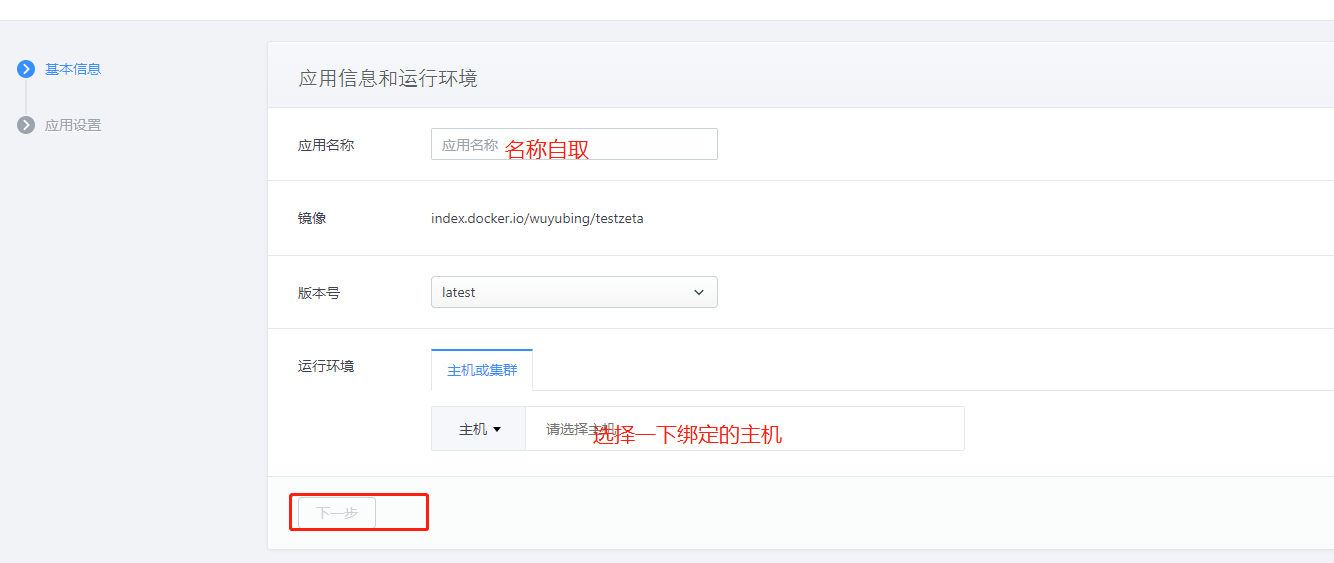
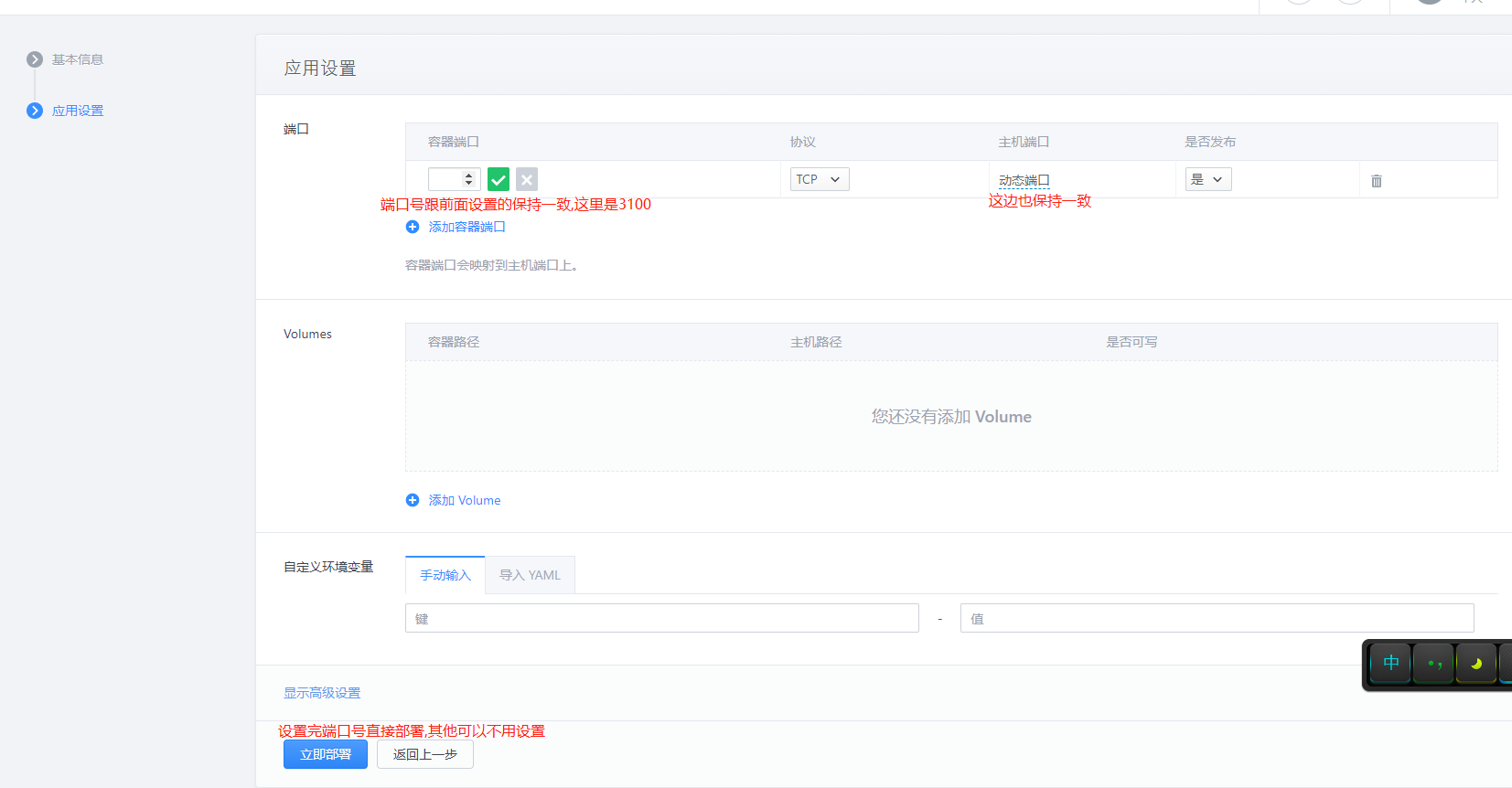
5.部署完之后查看状态是否正常

6.用nginx反向代理绑定域名访问指向这个端口(自行百度如何用nginx)
5 liunx部署docker执行下面命令
curl -fsSL https://get.docker.com | bash -s docker --mirror Aliyun
以上文件内容,(记录防止跟daocloud一样访问不了,访问不了的时候可以直接修改下面的内容自己做一个脚本):
#!/bin/sh
set -e
# Docker CE for Linux installation script
#
# See https://docs.docker.com/engine/install/ for the installation steps.
#
# This script is meant for quick & easy install via:
# $ curl -fsSL https://get.docker.com -o get-docker.sh
# $ sh get-docker.sh
#
# For test builds (ie. release candidates):
# $ curl -fsSL https://test.docker.com -o test-docker.sh
# $ sh test-docker.sh
#
# NOTE: Make sure to verify the contents of the script
# you downloaded matches the contents of install.sh
# located at https://github.com/docker/docker-install
# before executing.
#
# Git commit from https://github.com/docker/docker-install when
# the script was uploaded (Should only be modified by upload job):
SCRIPT_COMMIT_SHA="b2e29ef7a9a89840d2333637f7d1900a83e7153f"
# strip "v" prefix if present
VERSION="${VERSION#v}"
# The channel to install from:
# * nightly
# * test
# * stable
# * edge (deprecated)
DEFAULT_CHANNEL_VALUE="stable"
if [ -z "$CHANNEL" ]; then
CHANNEL=$DEFAULT_CHANNEL_VALUE
fi
DEFAULT_DOWNLOAD_URL="https://download.docker.com"
if [ -z "$DOWNLOAD_URL" ]; then
DOWNLOAD_URL=$DEFAULT_DOWNLOAD_URL
fi
DEFAULT_REPO_FILE="docker-ce.repo"
if [ -z "$REPO_FILE" ]; then
REPO_FILE="$DEFAULT_REPO_FILE"
fi
mirror=''
DRY_RUN=${DRY_RUN:-}
while [ $# -gt 0 ]; do
case "$1" in
--mirror)
mirror="$2"
shift
;;
--dry-run)
DRY_RUN=1
;;
--*)
echo "Illegal option $1"
;;
esac
shift $(( $# > 0 ? 1 : 0 ))
done
case "$mirror" in
Aliyun)
DOWNLOAD_URL="https://mirrors.aliyun.com/docker-ce"
;;
AzureChinaCloud)
DOWNLOAD_URL="https://mirror.azure.cn/docker-ce"
;;
esac
command_exists() {
command -v "$@" > /dev/null 2>&1
}
# version_gte checks if the version specified in $VERSION is at least
# the given CalVer (YY.MM) version. returns 0 (success) if $VERSION is either
# unset (=latest) or newer or equal than the specified version. Returns 1 (fail)
# otherwise.
#
# examples:
#
# VERSION=20.10
# version_gte 20.10 // 0 (success)
# version_gte 19.03 // 0 (success)
# version_gte 21.10 // 1 (fail)
version_gte() {
if [ -z "$VERSION" ]; then
return 0
fi
eval calver_compare "$VERSION" "$1"
}
# calver_compare compares two CalVer (YY.MM) version strings. returns 0 (success)
# if version A is newer or equal than version B, or 1 (fail) otherwise. Patch
# releases and pre-release (-alpha/-beta) are not taken into account
#
# examples:
#
# calver_compare 20.10 19.03 // 0 (success)
# calver_compare 20.10 20.10 // 0 (success)
# calver_compare 19.03 20.10 // 1 (fail)
calver_compare() (
set +x
yy_a="$(echo "$1" | cut -d'.' -f1)"
yy_b="$(echo "$2" | cut -d'.' -f1)"
if [ "$yy_a" -lt "$yy_b" ]; then
return 1
fi
if [ "$yy_a" -gt "$yy_b" ]; then
return 0
fi
mm_a="$(echo "$1" | cut -d'.' -f2)"
mm_b="$(echo "$2" | cut -d'.' -f2)"
if [ "${mm_a#0}" -lt "${mm_b#0}" ]; then
return 1
fi
return 0
)
is_dry_run() {
if [ -z "$DRY_RUN" ]; then
return 1
else
return 0
fi
}
is_wsl() {
case "$(uname -r)" in
*microsoft* ) true ;; # WSL 2
*Microsoft* ) true ;; # WSL 1
* ) false;;
esac
}
is_darwin() {
case "$(uname -s)" in
*darwin* ) true ;;
*Darwin* ) true ;;
* ) false;;
esac
}
deprecation_notice() {
distro=$1
distro_version=$2
echo
printf "\033[91;1mDEPRECATION WARNING\033[0m\n"
printf " This Linux distribution (\033[1m%s %s\033[0m) reached end-of-life and is no longer supported by this script.\n" "$distro" "$distro_version"
echo " No updates or security fixes will be released for this distribution, and users are recommended"
echo " to upgrade to a currently maintained version of $distro."
echo
printf "Press \033[1mCtrl+C\033[0m now to abort this script, or wait for the installation to continue."
echo
sleep 10
}
get_distribution() {
lsb_dist=""
# Every system that we officially support has /etc/os-release
if [ -r /etc/os-release ]; then
lsb_dist="$(. /etc/os-release && echo "$ID")"
fi
# Returning an empty string here should be alright since the
# case statements don't act unless you provide an actual value
echo "$lsb_dist"
}
echo_docker_as_nonroot() {
if is_dry_run; then
return
fi
if command_exists docker && [ -e /var/run/docker.sock ]; then
(
set -x
$sh_c 'docker version'
) || true
fi
# intentionally mixed spaces and tabs here -- tabs are stripped by "<<-EOF", spaces are kept in the output
echo
echo "================================================================================"
echo
if version_gte "20.10"; then
echo "To run Docker as a non-privileged user, consider setting up the"
echo "Docker daemon in rootless mode for your user:"
echo
echo " dockerd-rootless-setuptool.sh install"
echo
echo "Visit https://docs.docker.com/go/rootless/ to learn about rootless mode."
echo
fi
echo
echo "To run the Docker daemon as a fully privileged service, but granting non-root"
echo "users access, refer to https://docs.docker.com/go/daemon-access/"
echo
echo "WARNING: Access to the remote API on a privileged Docker daemon is equivalent"
echo " to root access on the host. Refer to the 'Docker daemon attack surface'"
echo " documentation for details: https://docs.docker.com/go/attack-surface/"
echo
echo "================================================================================"
echo
}
# Check if this is a forked Linux distro
check_forked() {
# Check for lsb_release command existence, it usually exists in forked distros
if command_exists lsb_release; then
# Check if the `-u` option is supported
set +e
lsb_release -a -u > /dev/null 2>&1
lsb_release_exit_code=$?
set -e
# Check if the command has exited successfully, it means we're in a forked distro
if [ "$lsb_release_exit_code" = "0" ]; then
# Print info about current distro
cat <<-EOF
You're using '$lsb_dist' version '$dist_version'.
EOF
# Get the upstream release info
lsb_dist=$(lsb_release -a -u 2>&1 | tr '[:upper:]' '[:lower:]' | grep -E 'id' | cut -d ':' -f 2 | tr -d '[:space:]')
dist_version=$(lsb_release -a -u 2>&1 | tr '[:upper:]' '[:lower:]' | grep -E 'codename' | cut -d ':' -f 2 | tr -d '[:space:]')
# Print info about upstream distro
cat <<-EOF
Upstream release is '$lsb_dist' version '$dist_version'.
EOF
else
if [ -r /etc/debian_version ] && [ "$lsb_dist" != "ubuntu" ] && [ "$lsb_dist" != "raspbian" ]; then
if [ "$lsb_dist" = "osmc" ]; then
# OSMC runs Raspbian
lsb_dist=raspbian
else
# We're Debian and don't even know it!
lsb_dist=debian
fi
dist_version="$(sed 's/\/.*//' /etc/debian_version | sed 's/\..*//')"
case "$dist_version" in
11)
dist_version="bullseye"
;;
10)
dist_version="buster"
;;
9)
dist_version="stretch"
;;
8)
dist_version="jessie"
;;
esac
fi
fi
fi
}
do_install() {
echo "# Executing docker install script, commit: $SCRIPT_COMMIT_SHA"
if command_exists docker; then
cat >&2 <<-'EOF'
Warning: the "docker" command appears to already exist on this system.
If you already have Docker installed, this script can cause trouble, which is
why we're displaying this warning and provide the opportunity to cancel the
installation.
If you installed the current Docker package using this script and are using it
again to update Docker, you can safely ignore this message.
You may press Ctrl+C now to abort this script.
EOF
( set -x; sleep 20 )
fi
user="$(id -un 2>/dev/null || true)"
sh_c='sh -c'
if [ "$user" != 'root' ]; then
if command_exists sudo; then
sh_c='sudo -E sh -c'
elif command_exists su; then
sh_c='su -c'
else
cat >&2 <<-'EOF'
Error: this installer needs the ability to run commands as root.
We are unable to find either "sudo" or "su" available to make this happen.
EOF
exit 1
fi
fi
if is_dry_run; then
sh_c="echo"
fi
# perform some very rudimentary platform detection
lsb_dist=$( get_distribution )
lsb_dist="$(echo "$lsb_dist" | tr '[:upper:]' '[:lower:]')"
if is_wsl; then
echo
echo "WSL DETECTED: We recommend using Docker Desktop for Windows."
echo "Please get Docker Desktop from https://www.docker.com/products/docker-desktop"
echo
cat >&2 <<-'EOF'
You may press Ctrl+C now to abort this script.
EOF
( set -x; sleep 20 )
fi
case "$lsb_dist" in
ubuntu)
if command_exists lsb_release; then
dist_version="$(lsb_release --codename | cut -f2)"
fi
if [ -z "$dist_version" ] && [ -r /etc/lsb-release ]; then
dist_version="$(. /etc/lsb-release && echo "$DISTRIB_CODENAME")"
fi
;;
debian|raspbian)
dist_version="$(sed 's/\/.*//' /etc/debian_version | sed 's/\..*//')"
case "$dist_version" in
11)
dist_version="bullseye"
;;
10)
dist_version="buster"
;;
9)
dist_version="stretch"
;;
8)
dist_version="jessie"
;;
esac
;;
centos|rhel|sles)
if [ -z "$dist_version" ] && [ -r /etc/os-release ]; then
dist_version="$(. /etc/os-release && echo "$VERSION_ID")"
fi
;;
*)
if command_exists lsb_release; then
dist_version="$(lsb_release --release | cut -f2)"
fi
if [ -z "$dist_version" ] && [ -r /etc/os-release ]; then
dist_version="$(. /etc/os-release && echo "$VERSION_ID")"
fi
;;
esac
# Check if this is a forked Linux distro
check_forked
# Print deprecation warnings for distro versions that recently reached EOL,
# but may still be commonly used (especially LTS versions).
case "$lsb_dist.$dist_version" in
debian.stretch|debian.jessie)
deprecation_notice "$lsb_dist" "$dist_version"
;;
raspbian.stretch|raspbian.jessie)
deprecation_notice "$lsb_dist" "$dist_version"
;;
ubuntu.xenial|ubuntu.trusty)
deprecation_notice "$lsb_dist" "$dist_version"
;;
fedora.*)
if [ "$dist_version" -lt 33 ]; then
deprecation_notice "$lsb_dist" "$dist_version"
fi
;;
esac
# Run setup for each distro accordingly
case "$lsb_dist" in
ubuntu|debian|raspbian)
pre_reqs="apt-transport-https ca-certificates curl"
if ! command -v gpg > /dev/null; then
pre_reqs="$pre_reqs gnupg"
fi
apt_repo="deb [arch=$(dpkg --print-architecture) signed-by=/etc/apt/keyrings/docker.gpg] $DOWNLOAD_URL/linux/$lsb_dist $dist_version $CHANNEL"
(
if ! is_dry_run; then
set -x
fi
$sh_c 'apt-get update -qq >/dev/null'
$sh_c "DEBIAN_FRONTEND=noninteractive apt-get install -y -qq $pre_reqs >/dev/null"
$sh_c 'mkdir -p /etc/apt/keyrings && chmod -R 0755 /etc/apt/keyrings'
$sh_c "curl -fsSL \"$DOWNLOAD_URL/linux/$lsb_dist/gpg\" | gpg --dearmor --yes -o /etc/apt/keyrings/docker.gpg"
$sh_c "chmod a+r /etc/apt/keyrings/docker.gpg"
$sh_c "echo \"$apt_repo\" > /etc/apt/sources.list.d/docker.list"
$sh_c 'apt-get update -qq >/dev/null'
)
pkg_version=""
if [ -n "$VERSION" ]; then
if is_dry_run; then
echo "# WARNING: VERSION pinning is not supported in DRY_RUN"
else
# Will work for incomplete versions IE (17.12), but may not actually grab the "latest" if in the test channel
pkg_pattern="$(echo "$VERSION" | sed "s/-ce-/~ce~.*/g" | sed "s/-/.*/g").*-0~$lsb_dist"
search_command="apt-cache madison 'docker-ce' | grep '$pkg_pattern' | head -1 | awk '{\$1=\$1};1' | cut -d' ' -f 3"
pkg_version="$($sh_c "$search_command")"
echo "INFO: Searching repository for VERSION '$VERSION'"
echo "INFO: $search_command"
if [ -z "$pkg_version" ]; then
echo
echo "ERROR: '$VERSION' not found amongst apt-cache madison results"
echo
exit 1
fi
if version_gte "18.09"; then
search_command="apt-cache madison 'docker-ce-cli' | grep '$pkg_pattern' | head -1 | awk '{\$1=\$1};1' | cut -d' ' -f 3"
echo "INFO: $search_command"
cli_pkg_version="=$($sh_c "$search_command")"
fi
pkg_version="=$pkg_version"
fi
fi
(
pkgs="docker-ce${pkg_version%=}"
if version_gte "18.09"; then
# older versions didn't ship the cli and containerd as separate packages
pkgs="$pkgs docker-ce-cli${cli_pkg_version%=} containerd.io"
fi
if version_gte "20.10"; then
pkgs="$pkgs docker-compose-plugin"
fi
if version_gte "20.10" && [ "$(uname -m)" = "x86_64" ]; then
# also install the latest version of the "docker scan" cli-plugin (only supported on x86 currently)
pkgs="$pkgs docker-scan-plugin"
fi
# TODO(thaJeztah) remove the $CHANNEL check once 22.06 and docker-buildx-plugin is published to the "stable" channel
if [ "$CHANNEL" = "test" ] && version_gte "22.06"; then
pkgs="$pkgs docker-buildx-plugin"
fi
if ! is_dry_run; then
set -x
fi
$sh_c "DEBIAN_FRONTEND=noninteractive apt-get install -y -qq --no-install-recommends $pkgs >/dev/null"
if version_gte "20.10"; then
# Install docker-ce-rootless-extras without "--no-install-recommends", so as to install slirp4netns when available
$sh_c "DEBIAN_FRONTEND=noninteractive apt-get install -y -qq docker-ce-rootless-extras${pkg_version%=} >/dev/null"
fi
)
echo_docker_as_nonroot
exit 0
;;
centos|fedora|rhel)
if [ "$(uname -m)" != "s390x" ] && [ "$lsb_dist" = "rhel" ]; then
echo "Packages for RHEL are currently only available for s390x."
exit 1
fi
yum_repo="$DOWNLOAD_URL/linux/$lsb_dist/$REPO_FILE"
if ! curl -Ifs "$yum_repo" > /dev/null; then
echo "Error: Unable to curl repository file $yum_repo, is it valid?"
exit 1
fi
if [ "$lsb_dist" = "fedora" ]; then
pkg_manager="dnf"
config_manager="dnf config-manager"
enable_channel_flag="--set-enabled"
disable_channel_flag="--set-disabled"
pre_reqs="dnf-plugins-core"
pkg_suffix="fc$dist_version"
else
pkg_manager="yum"
config_manager="yum-config-manager"
enable_channel_flag="--enable"
disable_channel_flag="--disable"
pre_reqs="yum-utils"
pkg_suffix="el"
fi
(
if ! is_dry_run; then
set -x
fi
$sh_c "$pkg_manager install -y -q $pre_reqs"
$sh_c "$config_manager --add-repo $yum_repo"
if [ "$CHANNEL" != "stable" ]; then
$sh_c "$config_manager $disable_channel_flag docker-ce-*"
$sh_c "$config_manager $enable_channel_flag docker-ce-$CHANNEL"
fi
$sh_c "$pkg_manager makecache"
)
pkg_version=""
if [ -n "$VERSION" ]; then
if is_dry_run; then
echo "# WARNING: VERSION pinning is not supported in DRY_RUN"
else
pkg_pattern="$(echo "$VERSION" | sed "s/-ce-/\\\\.ce.*/g" | sed "s/-/.*/g").*$pkg_suffix"
search_command="$pkg_manager list --showduplicates 'docker-ce' | grep '$pkg_pattern' | tail -1 | awk '{print \$2}'"
pkg_version="$($sh_c "$search_command")"
echo "INFO: Searching repository for VERSION '$VERSION'"
echo "INFO: $search_command"
if [ -z "$pkg_version" ]; then
echo
echo "ERROR: '$VERSION' not found amongst $pkg_manager list results"
echo
exit 1
fi
if version_gte "18.09"; then
# older versions don't support a cli package
search_command="$pkg_manager list --showduplicates 'docker-ce-cli' | grep '$pkg_pattern' | tail -1 | awk '{print \$2}'"
cli_pkg_version="$($sh_c "$search_command" | cut -d':' -f 2)"
fi
# Cut out the epoch and prefix with a '-'
pkg_version="-$(echo "$pkg_version" | cut -d':' -f 2)"
fi
fi
(
pkgs="docker-ce$pkg_version"
if version_gte "18.09"; then
# older versions didn't ship the cli and containerd as separate packages
if [ -n "$cli_pkg_version" ]; then
pkgs="$pkgs docker-ce-cli-$cli_pkg_version containerd.io"
else
pkgs="$pkgs docker-ce-cli containerd.io"
fi
fi
if version_gte "20.10" && [ "$(uname -m)" = "x86_64" ]; then
# also install the latest version of the "docker scan" cli-plugin (only supported on x86 currently)
pkgs="$pkgs docker-scan-plugin"
fi
if version_gte "20.10"; then
pkgs="$pkgs docker-compose-plugin docker-ce-rootless-extras$pkg_version"
fi
# TODO(thaJeztah) remove the $CHANNEL check once 22.06 and docker-buildx-plugin is published to the "stable" channel
if [ "$CHANNEL" = "test" ] && version_gte "22.06"; then
pkgs="$pkgs docker-buildx-plugin"
fi
if ! is_dry_run; then
set -x
fi
$sh_c "$pkg_manager install -y -q $pkgs"
)
echo_docker_as_nonroot
exit 0
;;
sles)
if [ "$(uname -m)" != "s390x" ]; then
echo "Packages for SLES are currently only available for s390x"
exit 1
fi
sles_version="${dist_version##*.}"
sles_repo="$DOWNLOAD_URL/linux/$lsb_dist/$REPO_FILE"
opensuse_repo="https://download.opensuse.org/repositories/security:SELinux/SLE_15_SP$sles_version/security:SELinux.repo"
if ! curl -Ifs "$sles_repo" > /dev/null; then
echo "Error: Unable to curl repository file $sles_repo, is it valid?"
exit 1
fi
pre_reqs="ca-certificates curl libseccomp2 awk"
(
if ! is_dry_run; then
set -x
fi
$sh_c "zypper install -y $pre_reqs"
$sh_c "zypper addrepo $sles_repo"
if ! is_dry_run; then
cat >&2 <<-'EOF'
WARNING!!
openSUSE repository (https://download.opensuse.org/repositories/security:SELinux) will be enabled now.
Do you wish to continue?
You may press Ctrl+C now to abort this script.
EOF
( set -x; sleep 30 )
fi
$sh_c "zypper addrepo $opensuse_repo"
$sh_c "zypper --gpg-auto-import-keys refresh"
$sh_c "zypper lr -d"
)
pkg_version=""
if [ -n "$VERSION" ]; then
if is_dry_run; then
echo "# WARNING: VERSION pinning is not supported in DRY_RUN"
else
pkg_pattern="$(echo "$VERSION" | sed "s/-ce-/\\\\.ce.*/g" | sed "s/-/.*/g")"
search_command="zypper search -s --match-exact 'docker-ce' | grep '$pkg_pattern' | tail -1 | awk '{print \$6}'"
pkg_version="$($sh_c "$search_command")"
echo "INFO: Searching repository for VERSION '$VERSION'"
echo "INFO: $search_command"
if [ -z "$pkg_version" ]; then
echo
echo "ERROR: '$VERSION' not found amongst zypper list results"
echo
exit 1
fi
search_command="zypper search -s --match-exact 'docker-ce-cli' | grep '$pkg_pattern' | tail -1 | awk '{print \$6}'"
# It's okay for cli_pkg_version to be blank, since older versions don't support a cli package
cli_pkg_version="$($sh_c "$search_command")"
pkg_version="-$pkg_version"
search_command="zypper search -s --match-exact 'docker-ce-rootless-extras' | grep '$pkg_pattern' | tail -1 | awk '{print \$6}'"
rootless_pkg_version="$($sh_c "$search_command")"
rootless_pkg_version="-$rootless_pkg_version"
fi
fi
(
pkgs="docker-ce$pkg_version"
if version_gte "18.09"; then
if [ -n "$cli_pkg_version" ]; then
# older versions didn't ship the cli and containerd as separate packages
pkgs="$pkgs docker-ce-cli-$cli_pkg_version containerd.io"
else
pkgs="$pkgs docker-ce-cli containerd.io"
fi
fi
if version_gte "20.10"; then
pkgs="$pkgs docker-compose-plugin docker-ce-rootless-extras$pkg_version"
fi
# TODO(thaJeztah) remove the $CHANNEL check once 22.06 and docker-buildx-plugin is published to the "stable" channel
if [ "$CHANNEL" = "test" ] && version_gte "22.06"; then
pkgs="$pkgs docker-buildx-plugin"
fi
if ! is_dry_run; then
set -x
fi
$sh_c "zypper -q install -y $pkgs"
)
echo_docker_as_nonroot
exit 0
;;
*)
if [ -z "$lsb_dist" ]; then
if is_darwin; then
echo
echo "ERROR: Unsupported operating system 'macOS'"
echo "Please get Docker Desktop from https://www.docker.com/products/docker-desktop"
echo
exit 1
fi
fi
echo
echo "ERROR: Unsupported distribution '$lsb_dist'"
echo
exit 1
;;
esac
exit 1
}
# wrapped up in a function so that we have some protection against only getting
# half the file during "curl | sh"
do_install



 浙公网安备 33010602011771号
浙公网安备 33010602011771号